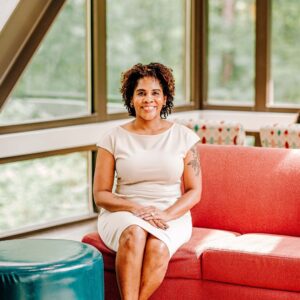As a pediatrician, wife, mother, and advocate, I’ve dedicated my life to understanding and supporting individuals with autism, particularly within the Black community. Over the years, I’ve seen firsthand the challenges that families of color face when seeking an autism diagnosis and the necessary services for their children.
This issue is deeply personal to me—not just as a professional but also as a mother and wife navigating these waters in my own family.
The Diagnosis Gap
It’s well known that early intervention is crucial for children with autism. The earlier a child is diagnosed, the sooner they can access the resources and support they need to thrive. However, studies show that Black children are often diagnosed much later than their white counterparts. While parents of color typically voice concerns about their child’s development around the age of two, these concerns are often not taken seriously. As a result, these children are not diagnosed with autism until much later—sometimes as late as five or six years old.
This delay is not just a minor inconvenience; it has lasting effects on the child’s development and access to critical early intervention services.
From birth to age three, children are eligible for early intervention programs that are free of charge. After age three, they can access services through the school system, such as 504 plans and Individualized Education Programs (IEPs).
These services are vital, yet many Black children miss out on them during the most formative years of their lives due to delayed diagnosis.
Misdiagnosis and Implicit Bias
One of the most significant barriers to timely diagnosis is the presence of implicit bias in the healthcare system. It’s not uncommon for clinicians to attribute the behaviors of Black children to trauma or socioeconomic factors rather than considering autism as a possibility. This tendency leads to misdiagnoses and a failure to provide the appropriate care and support.
For example, behaviors such as a child being withdrawn or shy might be attributed to trauma or socio-economic challenges, particularly in children of color.
This is not only a disservice to the child but also to the family who may feel unheard and marginalized in their attempts to seek help.
As clinicians, we must recognize that trauma and autism, while they may present with overlapping symptoms, are not the same. It’s our responsibility to approach each case with an open mind, ensuring that we are not allowing biases to cloud our judgment.
The Importance of Listening to Parents
Parents are the experts on their children. They know when something isn’t quite right, even if they can’t put a name to it. Yet, all too often, their concerns are dismissed, especially when the parent is from a marginalized group. This dismissal is particularly damaging because it delays the process of getting the child the help they need.
In my own experience, both personally and professionally, I’ve seen how these biases play out.
My son, for instance, was not diagnosed with autism until he was 11, despite showing signs much earlier. His behaviors were often misinterpreted as social awkwardness or even laziness. It wasn’t until later, after my husband received his own late-in-life diagnosis, that we recognized the same patterns in our son.
This experience has fueled my passion for ensuring that other families do not face the same delays and challenges.
It’s vital that we, as healthcare providers, take the time to listen to parents, ask the right questions, and consider all possibilities when it comes to the health and well-being of their children.
Moving Forward
The disparities in autism diagnosis and treatment for Black families are significant, but they are not insurmountable. By increasing awareness, addressing implicit biases, and ensuring that all children receive the same level of care and consideration, we can begin to close this gap.
As a community, we must advocate for better training for clinicians, so they are equipped to recognize the signs of autism in all children, regardless of their background.
We must also support parents in their role as advocates for their children, empowering them with the knowledge and resources they need to navigate the healthcare system effectively.
There is still much work to be done, but I am committed to being part of the solution.
By continuing to speak out, educate, and advocate, we can ensure that every child, regardless of race or background, has the opportunity to reach their full potential.
With love, Dr Mary
Start mental health conversations, gain encouragement, and find autism resources.
 Check out The Dr Mary Podcast!
Check out The Dr Mary Podcast!
Looking for more resources?!
Check out my podcast, The Dr Mary Podcast, to find encouragement, support, and resources for you or your loved one.
And if you want one-on-one assistance, schedule a free coaching

Recent Comments